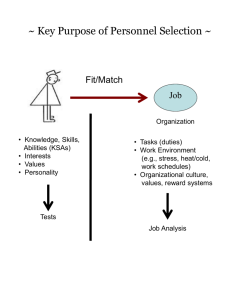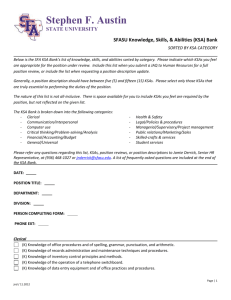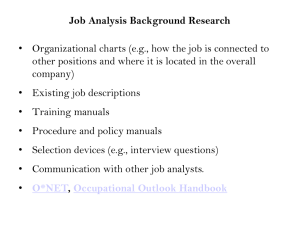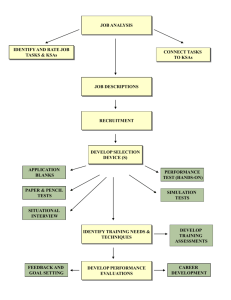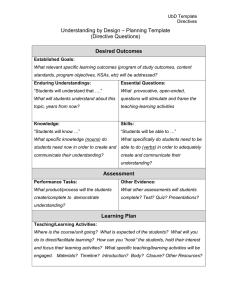The specific requirement (knowledge, skill or ability) is not already
advertisement
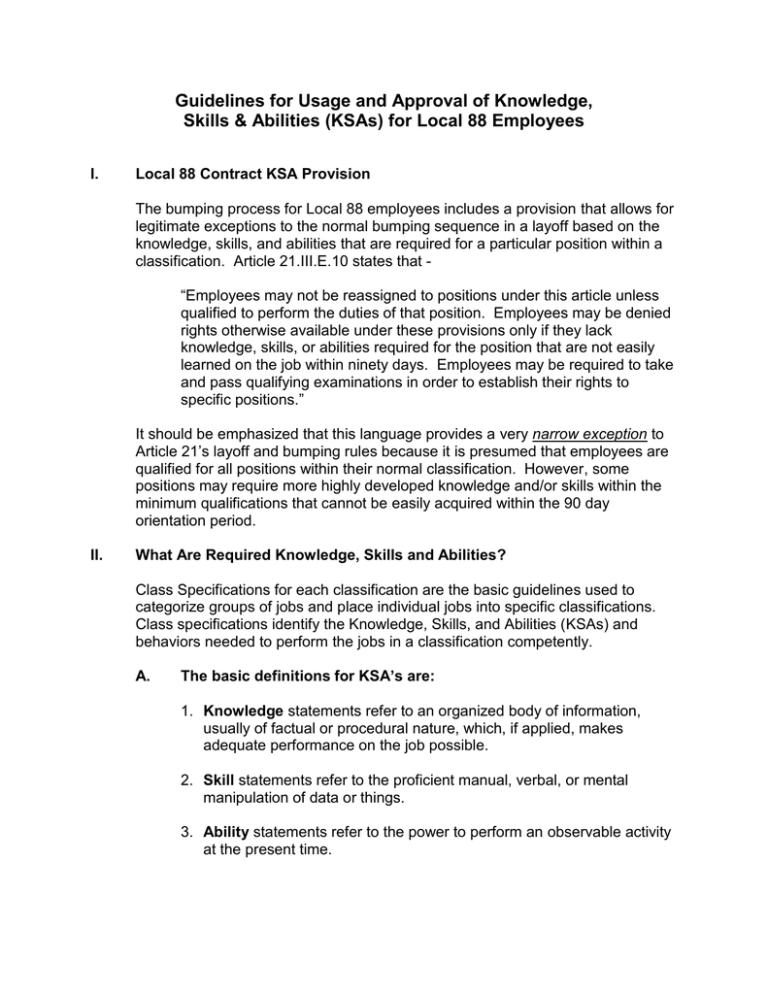
Guidelines for Usage and Approval of Knowledge, Skills & Abilities (KSAs) for Local 88 Employees I. Local 88 Contract KSA Provision The bumping process for Local 88 employees includes a provision that allows for legitimate exceptions to the normal bumping sequence in a layoff based on the knowledge, skills, and abilities that are required for a particular position within a classification. Article 21.III.E.10 states that “Employees may not be reassigned to positions under this article unless qualified to perform the duties of that position. Employees may be denied rights otherwise available under these provisions only if they lack knowledge, skills, or abilities required for the position that are not easily learned on the job within ninety days. Employees may be required to take and pass qualifying examinations in order to establish their rights to specific positions.” It should be emphasized that this language provides a very narrow exception to Article 21’s layoff and bumping rules because it is presumed that employees are qualified for all positions within their normal classification. However, some positions may require more highly developed knowledge and/or skills within the minimum qualifications that cannot be easily acquired within the 90 day orientation period. II. What Are Required Knowledge, Skills and Abilities? Class Specifications for each classification are the basic guidelines used to categorize groups of jobs and place individual jobs into specific classifications. Class specifications identify the Knowledge, Skills, and Abilities (KSAs) and behaviors needed to perform the jobs in a classification competently. A. The basic definitions for KSA’s are: 1. Knowledge statements refer to an organized body of information, usually of factual or procedural nature, which, if applied, makes adequate performance on the job possible. 2. Skill statements refer to the proficient manual, verbal, or mental manipulation of data or things. 3. Ability statements refer to the power to perform an observable activity at the present time. B. Examples of knowledge, skill, and ability requirements are: 1. Ability to pass a criminal background check 2. Knowledge and ability to speak/read/write a foreign language (must be a requirement of the position) 3. Possession of professional certifications and/or licenses 4. Advanced technical knowledge and/or skills (such as computer software application, operational program knowledge, etc.) 5. Knowledge, skill and ability to work effectively with specific communities to include minority populations. May require knowledge of cultural customs and practices. In addition to describing the KSA’s for a classification, the Class Specifications also define the Minimum Qualifications (MQs) needed to be eligible for appointment to the classification, typically in terms of required education and/or experience and/or licensure/certification. All applicants for employment must meet the minimum qualifications for the classification in order to be considered. Additional selection processes, such as oral or written exams, are used to determine the level of knowledge, skill and ability applicants possess in relation to the required KSA’s for the class and the particular position. III. How are KSA’s Used? We use KSAs to assure that our recruitment and layoff processes identify and select qualified individuals to fill positions. Valid KSAs assure that selection criteria are job related and defensible, as well as assist in determining the market rate for jobs. Required KSAs allow us to compare position-specific KSAs with the general KSAs for the classification, and document any minimum requirements that are specific to the position. Required KSAs are generally used in two ways: A. In recruitment and selection activities, to clarify or specifically target the minimum requirements identified in the job classification to enable the hiring manager to focus his/her search of the labor pool to the needs of the position and organization. B. In layoff and bumping activities, to identify the skills needed by an employee to be able to bump into a position. This information helps validate selection/rejection criteria and aids in determining if the person who is slated to bump into the position has the required KSAs. October 2013 1 In both cases, the purpose is to identify people who meet the minimum requirements to perform competently in a position. The Local 88 agreement has specific language around KSAs and employment exams for purposes of determining an individual employee’s right to bump into a position. While the standards an employee must meet for bumping purposes is different than those an applicant would need to meet in order to be competitive, the KSAs and minimum qualifications for a position should be the same, regardless of whether they are used for a competitive selection process or for bumping, and they must be based on the requirements of the position. In an open competitive recruitment, promotion, or transfer, identification of the best qualified applicant for the position is the primary objective in the selection process. In the case of layoff and potential bumping, the standard is only that the employee be qualified, not necessarily the best qualified, since the Local 88 contract provides employees with an expectation of continued employment based on seniority. The requirement under the contract is that an employee be able to pass a qualifying exam for the position (normally a score of 70%), and or has the necessary knowledge, skills and abilities to perform the duties of the position. Because Class Specifications are broad and cover a number of related positions, classification decisions are made based on how well a whole job fits within the available classification choices. It is common for individual job descriptions to include duties that are not typical of all positions in a classification. Some of a position’s duties may be those of a different classification, which could be at a higher, lower or the same salary range. Some positions may require all of the KSAs of the classification, additional specialized skills or knowledge, or licensure. These exceptions should be documented, approved, and brought to the attention of Class/Comp, so that Class Specifications may be revised to accurately reflect the job requirements, if needed. IV. Examples and Guidelines A. The specialized requirements must be consistent with the general requirements for the classification: 1. Example: Mental Health Consultant requires: “two years of professional experience in the aforementioned areas as a QMHP under OARs.” The classification includes a variety of specialty areas. A KSA should be submitted to specify the area of specialization required for the particular position. 2. Example: Corrections Counselor requires “Bachelor's degree from an accredited college or university with major course work in a behavioral science such as psychology, sociology, criminal justice, social work or a related field or equivalent.” A KSA that falls beyond the scope of the October 2013 2 job classification would be to require “a masters degree from an accredited college or university…..” 3. Example: In the required KSA’s section of the class specification, the Development Analyst, Senior lists: “A working understanding of the operational characteristics of a variety of computer platforms and operating systems.” In this example, the particular position works on the mainframe. The specific KSA request for this position might read: “A working understanding of the operational characteristics of mainframe platforms and operating systems”. 4. Example: Program Specialist requires working knowledge of and the ability to apply “applicable Federal, state, and local laws, rules, regulations and policies to program scope and operations.” The specific knowledge required for a Program Specialist position responsible for Domestic Violence Programs might read: knowledge of best practices in domestic violence intervention, especially those relating to the criminal justice system. 5. Example: Network Administrator Senior requires typically a BS degree and 5+ years of technical experience, or an equivalent combination of education and experience. The specific knowledge for the person in this NASr. responsible for Telecommunications might read: a minimum of 5 years technical experience which includes: working knowledge and understanding of the design, configuration and management of Nortel systems within a large installed base; administration of Meridian switches, voice mail, IVR, and Automatic Call Distributors; experience administering Meridian Mail, and Call Pilot unified messaging. 6. Example: Community Health Specialist 2 requires working knowledge of “the traditions and customs of the community being served” and “ability to speak the language of the community being served.” The specific knowledge required for a CHS 2 that serves a primarily Hispanic case load might read: This position requires advanced knowledge of and experience working with the Hispanic community, providing (fill in specific) services. This would be demonstrated by knowledge of the traditions, values and customs of the community being served as well as the ability to identify specific examples of experience working directly with individuals and families who identify with the Hispanic community. This position also requires fluency in both English and Spanish. October 2013 3 B. Do not submit a request for approval of KSA’s that are already included in the class specification: 1. Example: The job class of Dental Assistant (EFDA) requires “possession of an appropriate and valid certificate of Expanded Function Dental Assistant, including a certification of radiologic proficiency issued by the Oregon State Board of Dental Examiners; current Healthcare Provider CPR certification or ability to obtain certification.” No additional approval is needed to apply this requirement to an employee bumping into the position. All employees currently in this class must have this certification, as it is a requirement, and those who have previously held the class must either have the certification or be able to obtain it. 2. Example: The job class of Dental Assistant (EFDA) requires skill in methods and techniques of four-handed dental assisting. No additional approval is needed to require that an employee bumping into the position have this knowledge. C. Do not submit KSA’s for approval that can be easily learned within 90 days by an employee who meets the minimum qualifications for the classification. 1. Example: An administrative assistant position requires knowledge of Excel. An employee who holds this class, but has not used Excel, would normally be expected to be able to learn Excel within 90 days on the job, with minimal training. V. Review and Approval of KSAs A. The standards for review of KSA’s are: 1. Does the specialized knowledge, skill, ability, education, experience or licensure requirement fall within the general requirements for the class? 2. If the position was recruited competitively, could the labor market provide an adequate pool of applicants that would have this KSA? 3. If the answer to the second question is no, then what skills would the hiring manager seek in an applicant in order to train them to be successful within a reasonable amount of time? B. Questions to consider when applying for a KSA approval: 1. Has this position been previously recruited for and announced with the required knowledge, skills, and/or abilities (KSA) identified? If so, October 2013 4 provide copies of the announcement and the job description which outlines the required KSAs. 2. What screening tools have been used in the past to determine if the required KSAs are met (i.e. tests, oral interviews, review of employment and/or education history)? 3. If screening tools have not been used previously for this position, determine how you plan to screen for the required KSAs in the future. If there is no way to screen for the requested KSAs, then approval will not be granted. October 2013 5 C. Approval Process Managers should work with the Human Resources Staff within their Departments to create KSAs that meet the required standards. After the Human Resources Manager approves the KSA language, the Department Human Resources Staff will submit signed hardcopies and electronic copies of the below items to Labor Relations for approval: 1. Required Knowledge Skills and Abilities (KSA) Form 2. If you are requesting bilingual KSAs, you must also submit the Supplemental KSA Form for Bilingual Skill Requirements 3. Updated position description with the KSAs listed in the Education/Training/Experience section, as indicated on the document. If Labor Relations approves the KSAs, the language is sent to the Local 88 Business Representatives for a seven-day review period. During this time, Local 88 may comment upon the proposed KSAs and offer suggestions on the appropriateness and the KSA language. Labor Relations will work with Local 88 on these issues and consult with the Department Human Resources Staff as needed. After the seven-day comment period passes, the KSAs are considered approved with any revisions that may take place. Detailed information for KSAs and Bilingual Skill requirements can be found on Multco Commons at Human ResourcesLabor RelationsKSAs. There are also Guidelines for Completing the Supplemental KSA Form for Bilingual Skills Requirements on the site. October 2013 6


